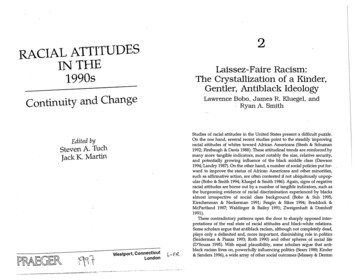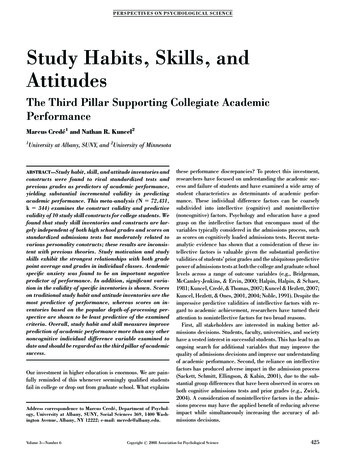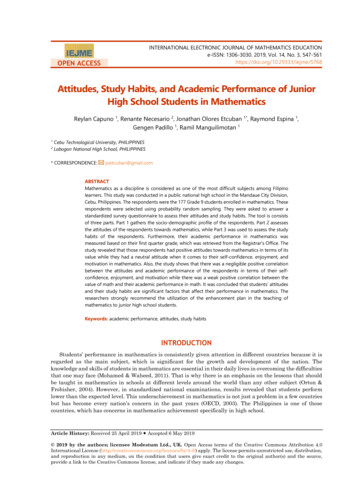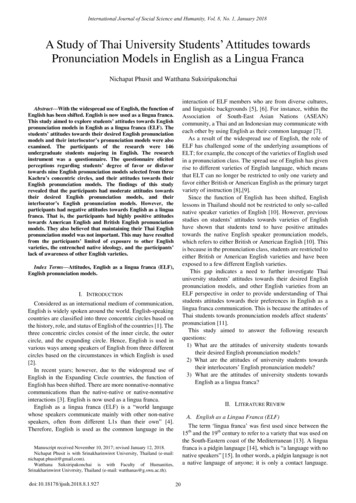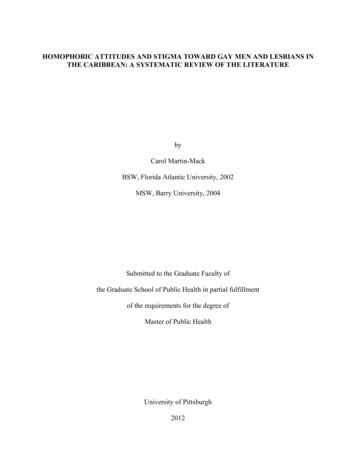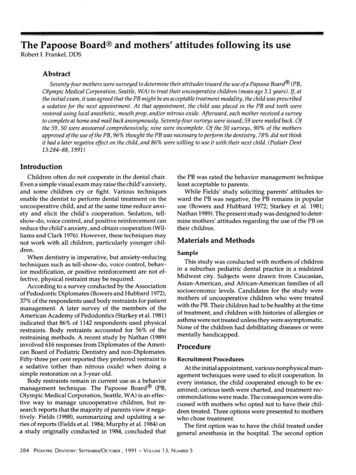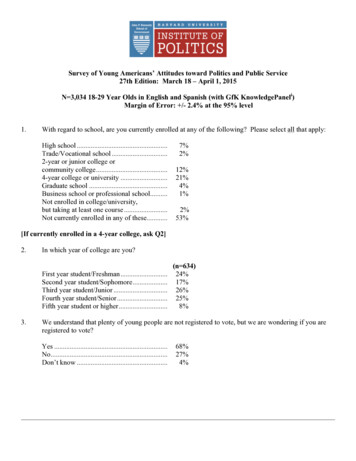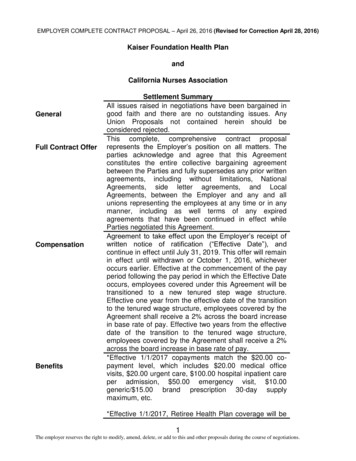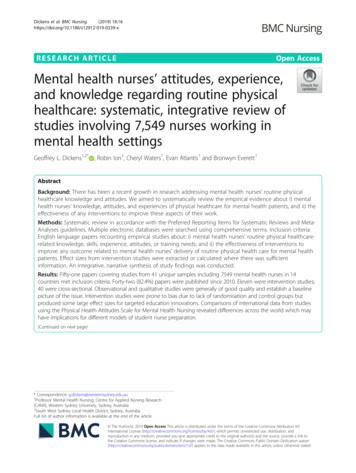
Transcription
Dickens et al. BMC Nursing(2019) ARCH ARTICLEOpen AccessMental health nurses’ attitudes, experience,and knowledge regarding routine physicalhealthcare: systematic, integrative review ofstudies involving 7,549 nurses working inmental health settingsGeoffrey L. Dickens1,2* , Robin Ion3, Cheryl Waters1, Evan Atlantis1 and Bronwyn Everett1AbstractBackground: There has been a recent growth in research addressing mental health nurses’ routine physicalhealthcare knowledge and attitudes. We aimed to systematically review the empirical evidence about i) mentalhealth nurses’ knowledge, attitudes, and experiences of physical healthcare for mental health patients, and ii) theeffectiveness of any interventions to improve these aspects of their work.Methods: Systematic review in accordance with the Preferred Reporting Items for Systematic Reviews and MetaAnalyses guidelines. Multiple electronic databases were searched using comprehensive terms. Inclusion criteria:English language papers recounting empirical studies about: i) mental health nurses’ routine physical healthcarerelated knowledge, skills, experience, attitudes, or training needs; and ii) the effectiveness of interventions toimprove any outcome related to mental health nurses’ delivery of routine physical health care for mental healthpatients. Effect sizes from intervention studies were extracted or calculated where there was sufficientinformation. An integrative, narrative synthesis of study findings was conducted.Results: Fifty-one papers covering studies from 41 unique samples including 7549 mental health nurses in 14countries met inclusion criteria. Forty-two (82.4%) papers were published since 2010. Eleven were intervention studies;40 were cross-sectional. Observational and qualitative studies were generally of good quality and establish a baselinepicture of the issue. Intervention studies were prone to bias due to lack of randomisation and control groups butproduced some large effect sizes for targeted education innovations. Comparisons of international data from studiesusing the Physical Health Attitudes Scale for Mental Health Nursing revealed differences across the world which mayhave implications for different models of student nurse preparation.(Continued on next page)* Correspondence: g.dickens@westernsydney.edu.au1Professor Mental Health Nursing, Centre for Applied Nursing Research(CANR), Western Sydney University, Sydney, Australia2South West Sydney Local Health District, Sydney, AustraliaFull list of author information is available at the end of the article The Author(s). 2019 Open Access This article is distributed under the terms of the Creative Commons Attribution 4.0International License (http://creativecommons.org/licenses/by/4.0/), which permits unrestricted use, distribution, andreproduction in any medium, provided you give appropriate credit to the original author(s) and the source, provide a link tothe Creative Commons license, and indicate if changes were made. The Creative Commons Public Domain Dedication o/1.0/) applies to the data made available in this article, unless otherwise stated.
Dickens et al. BMC Nursing(2019) 18:16Page 2 of 21(Continued from previous page)Conclusions: Mental health nurses’ ability and increasing enthusiasm for routine physical healthcare has beenhighlighted in recent years. Contemporary literature provides a base for future research which must now concentrateon determining the effectiveness of nurse preparation for providing physical health care for people with mentaldisorder, determining the appropriate content for such preparation, and evaluating the effectiveness both in terms ofnurse and patient- related outcomes. At the same time, developments are needed which are congruent with theneeds and wants of patients.Keywords: Mental health nurses, Emergency medicine, Deteriorating patient, Educational interventions, Attitudes,KnowledgeBackgroundPeople with a mental disorder diagnosis are at morethan double the risk of all-cause mortality than the general population. Most at risk are those with psychosis,mood disorder and anxiety diagnoses. Median length oflife lost by this group is 10.1 years greater for peoplewith a diagnosis of mental disorder than for generalpopulation controls, but mortality rates are significantlyhigher in studies which include inpatients [1]. While riskof unnatural causes of death, notably suicide, are greatlyincreased in this group, it is death from natural causesthat remains responsible for the vast majority of mortality. In people with schizophrenia, for example, cardiovascular disease accounts for about one third of alldeaths and cancer for one in six, while other commoncauses are diabetes mellitus, COPD, influenza, andpneumonia [2]. A relatively high rate of tobacco smokingin this group is implicated in significant increased mortality [3], as is obesity [4], exposure to high levels of antipsychotic pharmacological treatment [5], and mentaldisorder itself [1].Accordingly, the physical health of patients with mental disorder has been prioritised, becoming the focus ofguidelines for practitioners in general [6] and for mentalhealth nurses and other clinical professionals specifically[7–9]. However, while policies and guidelines are necessary prerequisites of change they must also be implemented in practice if they are to have a positive effect;one of the key barriers to change implementation formental health nurses has been identified as lack of confidence, skills, and knowledge [10]. Robson and Haddad([11]: p.74) identified that surprisingly ‘modest attention’had been paid to the issue of such attitudes and knowledge among nurses related to their role in physicalhealth care provision, and developed the Physical HealthAssessment Scale for mental health nurses (PHASe) inorder to further investigate the phenomenon. Since then,there has been a tangible and growing response amongmental health nursing academics and practitioners. Inrecent years, published literature reviews have covered adecade of UK-only research on the role of mental healthnurses in physical health care [12], patients’ and professionals’ perceptions of barriers to physical health carefor people with serious mental illness [13], the focus andcontent of nurse-provided physical healthcare for mentalhealth patients [14], and the physical health of peoplewith severe mental illness [15]. There has also been anupsurge in the amount of related empirical research.However, to date, no one has systematically reviewedthis growing literature about mental health nurses’ attitudes towards, or their related knowledge and experience about providing routine physical healthcare.Further, studies about the effectiveness of interventionsdesigned to improve their delivery of or attitudes to routine physical healthcare have not been systematically appraised. This is surprising given the known linksbetween nurses’ attitudes and their implementation ofevidence-based practice [16–18] and the centrality ofmeasuring nurses’ attitudes to physical health caredelivery in recent mental health nursing research on thetopic [11, 19, 20].In this context we have conducted a systematic reviewto identify, appraise, and synthesise existing evidencefrom empirical research literature about i) mental healthnurses’ experience of providing physical healthcare forpatients and about their related knowledge, skills, educational preparation, and attitudes; ii) the effectiveness ofany interventions aimed at improving or changing mental health nurse-related outcomes; and iii) to identify implications for the future provision of relevant trainingand education, for policy, research, and practice. Thespecific review question being addressed therefore is: whatis known from the international, English language,empirical literature about mental health nurses’ skills,knowledge, attitudes, and experiences regarding provisionof physical healthcare.MethodsDesignA systematic review of the literature following the relevant points of the Preferred Reporting Items for Systematic Reviews and Meta-Analyses [21].
Dickens et al. BMC Nursing(2019) 18:16Search strategySince the review scope encompassed questions about experience and effectiveness a dual literature search strategy was developed. For studies about mental healthnurses’ experience of delivering physical healthcare aPopulation Exposure Outcome (PEO) format reviewquestion was developed (Population: mental healthnurses; Exposure: physical healthcare provision forpatients or related training; Outcomes: experiential, social, educational, knowledge, or attitudinal terms, seeAdditional file 1: Table S1). For studies of the effectiveness of interventions to improve or change mentalhealth nurse-related outcomes a Population InterventionComparator Outcome (PICO) structure was implemented (Population: mental health nurses; Intervention:any intervention including physical health-related education, policy or guideline change; Comparator: any ornone; Outcome: any) [22]. We searched five electronicdatabases: i) CINAHL, ii) PubMed, iii) MedLine, iv)Scopus, and v) ProQuest Dissertations and Theses usingtext words and MeSH terms. The references list of all included studies, together with those of relevant literaturereviews, and the tables of contents of selected mentalhealth nursing journals were hand searched. The searchterms were informed by previous literature reviews onthe subject of physical healthcare in mental health. Theinitial search was conducted in April 2018 and re-run inSeptember 2018.Inclusion and exclusion criteriaInclusion criteria for studies were English language accounts of empirical research which investigated mentalhealth nurses’ experience of providing physical healthcare or examined the effectiveness of any interventionthat aimed to improve outcomes related to the provisionof physical healthcare. Thus, studies of interventionsaimed at changing nursing practice, behaviour, knowledge, attitudes, or experiences were eligible, but notthose which solely attempted to determine the effect ofan intervention on nurses in terms of patient outcomes.While improvement in patient care and outcomes isclearly the desirable endpoint of any intervention onnurses, previous reviews have indicated that no goodquality studies exist [23]. Additionally, studies were onlyeligible for inclusion where the practitioners involvedcomprised or included mental health or psychiatricnurses or mental health nursing students, or registerednurses whose practice was within mental health services.Included studies could have used any design or methodological approach. As in previous reviews, studiessolely about mental health nurses providing care forpeople with alcohol/ drug misuse, or mental disorder/substance misuse dual diagnosis were not eligible. Studies about mental health nurses and the provision ofPage 3 of 21emergency physical care or of their experience of providing care for the seriously deteriorating physical health ofa patient were omitted as this is the subject of a separatereview (Dickens et al. submitted).Data extractionInformation about the study title, author, publicationyear, data collection years, location (country), researchobjectives, aims or hypotheses, design, population,sample details and size, data sources, study variables (i.e.details of intervention) or other exposure, unit ofanalysis, and study findings were extracted from full textpapers. Corresponding authors of included studies werecontacted regarding any issues where clarification oradditional data could aid the review.Studies were categorised as interventional or observational. Intervention studies investigated the impact of aneducational, policy, or practice intervention in terms of anymental health nurse- or nursing- related outcome, e.g.,knowledge, attitudes, behaviour. Intervention studies werefurther sub-classified as simulation studies (as defined byBland et al. ([24]: p.668) “a dynamic process involving thecreation of a hypothetical opportunity that incorporates anauthentic representation of reality, facilitates active studentengagement and integrates the complexities of practicaland theoretical learning with opportunity for repetition,feedback, evaluation and reflection”), traditional educationalinterventions (e.g., lectures, workshops, workbooks), orpolicy-level interventions (e.g., requiring nurses to followsome new policy or implement some new practice). Observational studies either described mental health nurse- ornursing- related outcomes and/or utilised case controldesigns to compare them with those of other occupationalor professional groups and/or used qualitative methods.Study quality appraisalThe likelihood of bias in intervention studies wasassessed against criteria described by Thomas et al. [25]and encompassed assessment of the likelihood of selection bias in the obtained sample, study design, potentialconfounders, blinding, potential for bias in data collection from invalid instrumentation, and participant retention (see Additional file 2: Table S2). Relevant itemsfrom the US Department of Health & Human SciencesNIH Quality Assessment Tool for Observational Cohortand Cross-Sectional Studies [26] were used to assesscross-sectional observational studies (see Additional file 3:Table S3). Qualitative descriptive studies were assessedusing the Critical Appraisal Skills Programme [27] tool(See Additional file 4: Table S4). Multiple papers arisingfrom single studies were quality assessed as a single entity. Study quality was initially undertaken independentlyby at least two of the team. A good level of inter-rateragreement was achieved (Cohen’s Kappa 0.742 between
Dickens et al. BMC Nursing(2019) 18:16pairs of raters). Disputed items were discussed by GDand CW and consensus achieved.Study synthesisThe available total and subscale data from those studiesthat conducted data c
healthcare knowledge and attitudes. We aimed to systematically review the empirical evidence about i) mental health nurses’ knowledge, attitudes, and experiences of physical healthcare for mental health patients, and ii) the effectiveness of any interventions to improve these aspects of their work. Methods: Systematic review in accordance with the PreferredReporting Items for Systematic .



